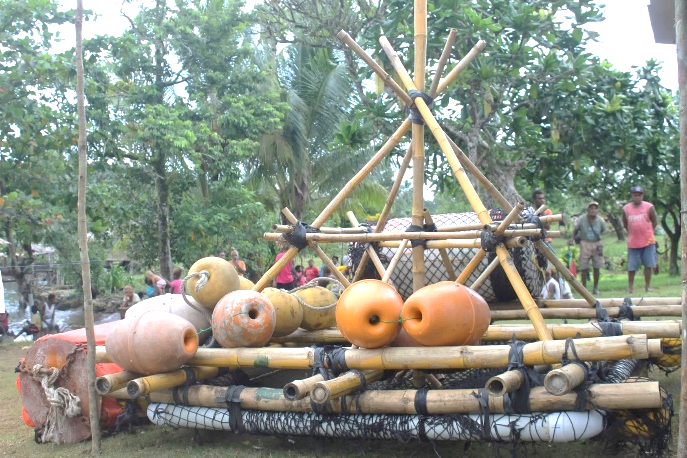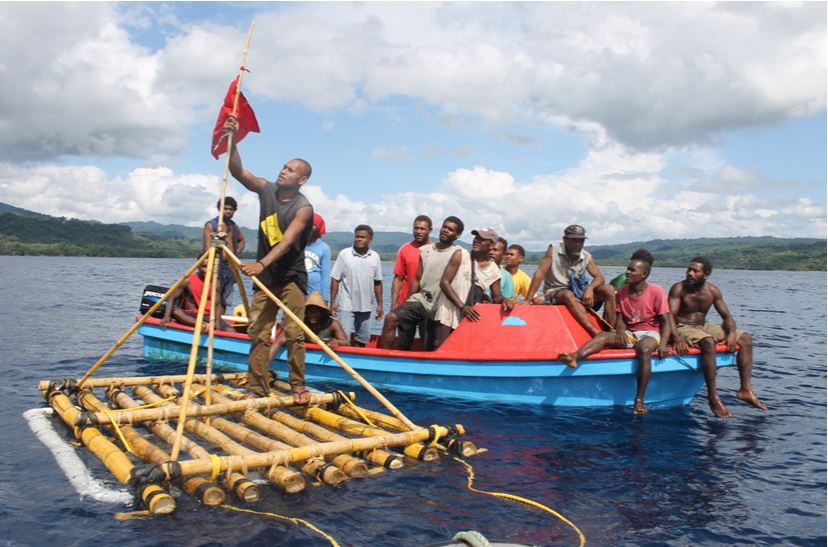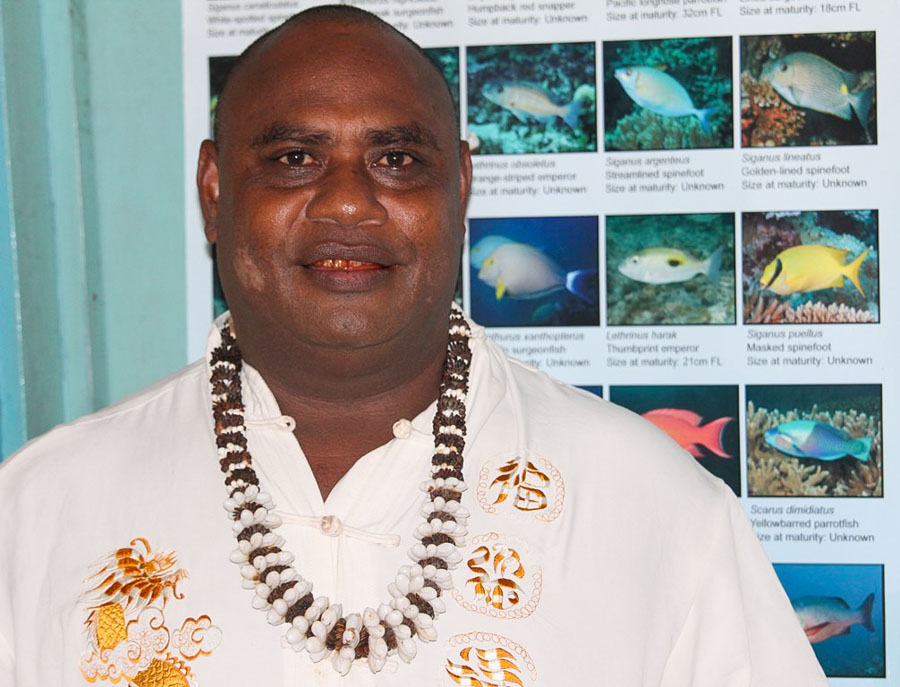27 March 2020 | TUNA PACIFIC
HONIARA, Solomon Islands - WITH the increasing threats of climate change on local fishing grounds of coastal communities around Malaita Province in Solomon Islands, communities are seeing the importance of the fish-aggregating devices (FADs) in providing them with alternative fishing grounds.
In Solomon Islands, small-scale commercial fisheries are dotted around the provinces, and focus on providing mainly sea resources such as sea shells, beche-de-mer, and shark fins for export.
These commodities are an important source of cash for local Solomon Islanders. However, in recent years, coastal communities in the Solomon Islands have seen drastic changes that have affected their daily fishing activities.
These changes gave birth to the local marine management area (LMMA) initiative, through which coastal communities around Malaita understood the importance of protecting their reefs from overfishing and other harvesting activities.
The project: Malaita provincial government and WorldFish
Since 2018, eight communities in Malaita Province have utilised FADs to make their fishing easier. They are Suava Bay, Onepusu and Mandalua in North Malaita; Gwanatafu in West Fataleka; Fote, and Bio in West Kwara’ae; Ta’arutona in West Are’are; and Ambitona in East Kwaio.
The Malaita Provincial Fisheries office and WorldFish Auki have teamed up for the great partnership, which resulted in eight FADs being deployed in the seas near these communities in March 2018.

Bamboo floater in Suava Bay ready for deployment. Photo: Ronald Toito’ona. 
FAD deployment in Suava Bay.
Photo: Ronald Toito’ona.
The FADs were deployed by a team consisting of people from WorldFish and Malaita Provincial Fisheries. The eight communities are believed to have put into practice LMMAs, to restrict use of reefs close to their villages from being fished or gleaned.
 |
| Mathew Isihanua from the Malaita Provincial Fishery Office in yellow, WorldFish team, and people from Ta`arutona community went out for depth sounding before deploying FADs. Photo: Ronald Toito’ona. |
Today, due to the value of marine resources like fish and seashells in Solomon Islands domestic markets, people put more pressure on the reefs than ever in human history. Harvesting of marine resources for daily food and income over the years has so affected many reefs in Malaita that they have lost much of their rich marine life.
Some communities have begun to realise that relying heavily on the reefs needs to be stopped to allow reefs to revive, and their marine richness to return and continue to provide the current generation and future generations with food and income.
However, the challenge that materialises for adopting an LMMA is that it prevents communities that depend on reefs from looking elsewhere for fish and seashells to satisfy daily needs. This is becoming irritation, especially to those who depend on harvesting marine resources.
 |
| Malaita Provincial Fisheries boss Martin Jasper |
According to Martin Jasper from the Malaita Provincial Fisheries office in Auki, the FADs are actually meant to relieve fishing pressure from the reefs, especially when the reefs are put under an LMMA to regain their rich marine life.
Mr Jasper said in early 2019 that the FAD distribution was in its second phase, that is implementation. The project is being implemented under the Coral Triangle Initiative (CTI), funded by the Asian Development Bank (ADB).
“This is the second phase of the project implemented under the Coral Triangle Initiative and funded by Asian Development Bank,” Mr Jasper said.
“WorldFish in collaboration with the Malaita Provincial Fisheries deployed FADs to the eight selected communities that applied for the FADs.
“More than 50 communities applied, and only eight were accepted due to limited funds available,” he added.
Mr Jasper explains that before the distribution and installation of the FADs, an awareness tour and constructions of FADs and anchors was conducted in March 2018.
“This tour was for definite deployment of FADs and community-based resource management awareness that linked with FADs activities,” he said.
Following the deployment of the FADs, communities in North Malaita have told the Auki Provincial Fisheries office that they are benefiting from the FADs as the equipment made fishing easier for them, which means they do not have to fish in the LMMA.
In the meantime, Mr Jasper is calling on the eight communities to take care of the FADs so that they will continue to attract more fish to make fishing easier.
Not only that, he also extended the call to sea users, fishers, and the travelling public to respect the FADs because they are deployed purposely to provide alternative fishing ground for the communities to relieve pressure on their reefs.
Mr Jasper said there are few recorded incidents of FAD vandalism, where people cut the anchor and ropes attached to the FADs for no good reason.
“FADs have played a major role in communities practicing LMMA because without FADs people will not respect the LMMA and will continue to harvest marine resources in the management areas,” he said.
Lilisiana community’s FAD engagement
Learning from the success of the eight communities, the Lilisiana community in the Langalanga division of Malaita decided to follow suit. Like other coastal communities, the people of Lilisiana derived much of their protein from fish while selling surplus supply at Auki, Malaita’s provincial capital, to meet other household needs and wants.
However, their heavy reliance on the resource depleted the supply of fish in the nearby reefs. This situation forced the fishers of Lilisiana to paddle further out to sea to fish.
The fishers blamed that the change in weather conditions, saying they had muddled up the regular migratory fish pattern. The presence of seasonal fish species such as yellowfin tuna, rainbow fish and even kingfish appear to be unpredictable to most, even to the elites in the trade.
As a result, fishing becomes harder and fishers often return home with very small catche that are sometimes enough for family consumption only. Whenever a fishing trip is unsuccessful, it badly affects family income.
In 2017, the fishermen of Lilisiana formed a group called the Auki Bay Fishermen Association (ABFA). ABFA was established to create an avenue for fishers of Lilisiana to support their families through the provision of food and income.
 |
| Members of ABFA witness the commissioning of the FAD. Photo: Ronald Toito’ona. |
The FADs assist local fishers to gain access to tuna stocks, and minimise their travel costs (boat fuel and time). FADs also improve safety at sea by reducing the need to fish far away, and encouraging fishers to fish at least some of the time in a “known” place.
ABFA is the first fishing association in Malaita Province to create a FAD at the village level without assistance from the Ministry of Fisheries.
ABFA chairman Joe Talanimoli told Malaita Star Magazine during the official launching of the FAD in January this year that making a FAD at the village wasn’t easy.
“To make a FAD at the village level without funding support is not an easy task because everything costs money,” Talanimoli said.
However, through collaborative and collective efforts from more than 100 ABFA members, they managed to complete the FAD which cost them over $8,000 within two weeks.
“Most of the materials required and used for the FAD were sourced from villagers at affordable cost,” the chairman added.
Now that the FAD was finally deployed at sea, ABFA members could now look forward to improving their catches to support their families, he said with a smile.
Following the launch, ABFA appointed a body that is responsible for maintaining the FAD.
Since the introduction of the initiative two years ago, the communities had benefited greatly from the FAD initiative. Auki market, as well as Honiara Central market, are the usual destinations of FAD catches.
However, to ensure that everyone gets maximum benefits from the initiative, all fishers and community members were told to look after the equipment so that it would continue to support them meet their family needs and wants. The communities were also cautioned about penalties under the Fisheries Act if someone was found tampering with or vandalising the equipment.


No comments:
Post a Comment